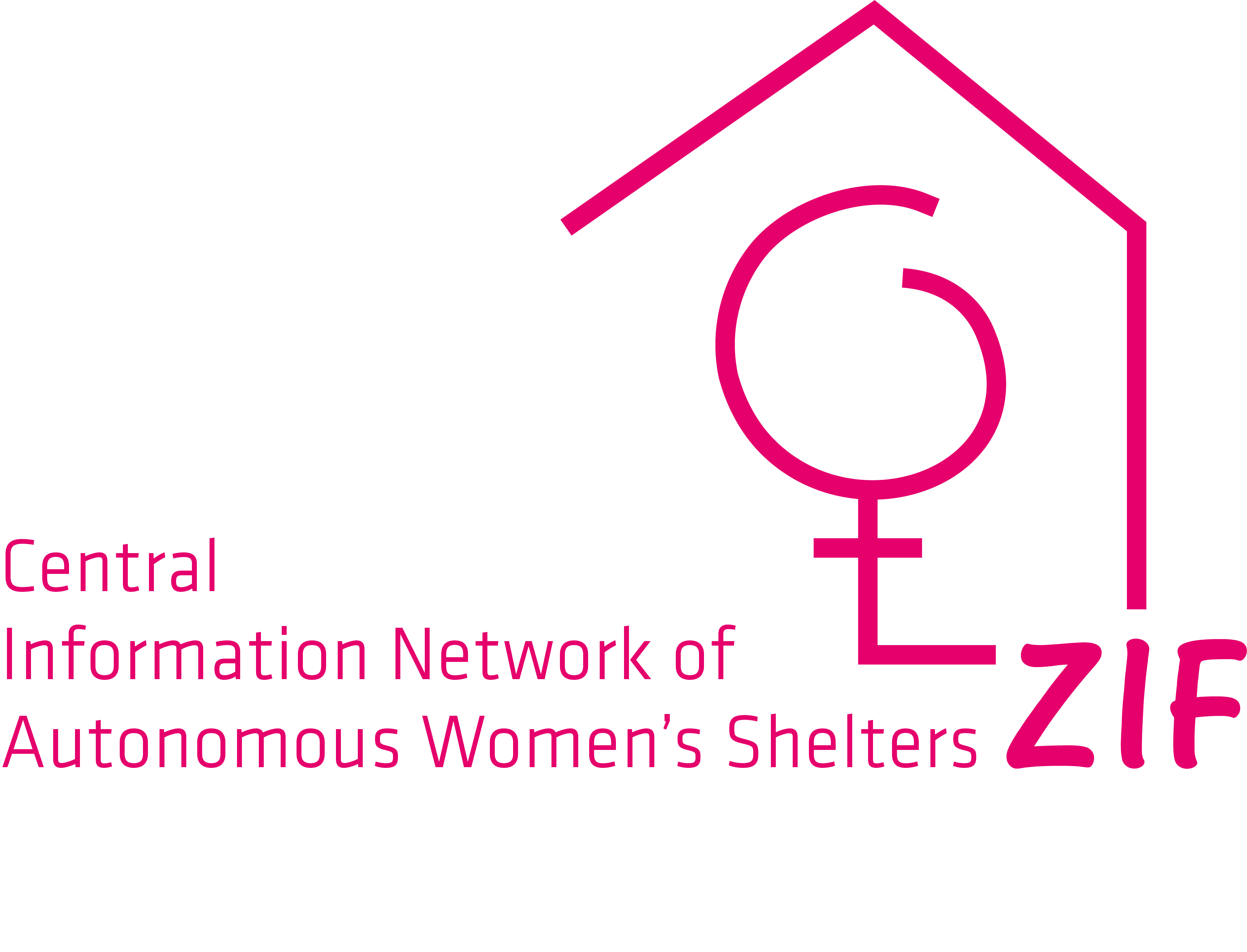Zentrale Informationsstelle Autonomer Frauenhäuser
The ZIF (Zentrale Informationsstelle Autonomer Frauenhäuser) was founded in 1980 as a central information point for autonomous women's refuges. Since then it has been committed to stopping violence against women and improving the situation of women who have been affected by violence and their children.
- The ZIF is not tied to any political party or religious denomination, has a feminist and anti-racist understanding of itself and works unequivocally for women who have been affected by violence and their children.
- The ZIF is financed solely through membership contributions of the women's refuge organisations organised within it and from donations.
- The ZIF coordinates and moderates the political and material conceptual relationships between the autonomous women's refuges.
- The ZIF is the voice of autonomous women's refuges at federal policy level, publishing on their behalf opinion pieces and press releases concerning the issues of violence against women, violence and girls and boys and the situation of women's refuges.
- The ZIF is what is known as a "focal point" of the European WAVE network.
WAVE (Women Against Violence in Europe) networks women's support institutions right across Europe who are committed to women and their children who are affected by violence.
Representatives of the ZIF attended the World Conferences of Women's Shelters in Edmonton, Canada, in 2008, in Washington, USA, in 2012 and in The Hague, Netherlands, in 2015.
Tasks of the ZIF
The ZIF: The ZIF has been a successful example of enduring networking, coordination and public relations work based on fundamental democratic principles since 1980.
Financing:
The ZIF is financed solely through membership contributions of the autonomous women's refuges and donations. This financial independence from public sector funding ensures the political independence of the ZIF.
Rotation principle:
The ZIF is elected by its member associations for a period of 3 years and is connected to a women's refuge association. Two re-elections are allowed. The rotation principle is intended to prevent a lasting concentration of power. The fact that ZIF staff work not only in the ZIF itself but also in the women's refuge ensures that they always remain grounded in reality.
Tasks:
- Day-to-day business
- Coordination of the nationwide internal networking activities
- Organisation of conventions, campaigns and continuous professional development events
- Public relations
- Press relations
- Drafting of articles, opinion pieces and position papers
- Fundraising
- Lobbying
Cooperation:
The coordinating body of the autonomous women's refuges determines the focus of activities and supports the work of the ZIF. It is composed of representatives of the federal states as well as various working groups involved in this area (e.g. Finanz AG, AG Femizide verhindern, Kindschaftsrechts-AG).
Representation/memberships:
- Beirat Hilfetelefon (a helpline advisory board)
- Bündnis Istanbul Konvention (Istanbul Convention Alliance)
- Bund-Länder-AG "Häusliche Gewalt" (a federal and state-level working group on domestic violence)
- Cedaw Allianz zum Staatenbericht der Bundesregierung (CEDAW Alliance on the federal government's state report)
- Deutscher Frauenrat (National Council of German Women’s Organizations)
- UN Women Dialogue Forum
- WAVE (Women Against Violence Europe)
The ZIF team consists of four staff of the associations Frauenhaus Osnabrück e.V., Frauenhaus Rhein- Erftkreis e.V., Frauen helfen Frauen e.V. Bad Hersfeld und Hestia e.V. Berlin
Esther Bierbaum,
Janin Harig,
Saskia Schefzik,
Nadine Weber
History
As the number of women's refuges began to grow, delegates attending the 8th national (later federal) women's refuge congress in Braunschweig in 1980 decided to establish the Zentrale Informationsstelle Autonomer Frauenhäuser (ZIF) in Hamburg as a networking, information and coordination centre. Initially the ZIF's location changed every year.Even by this time, the women's refuge initiatives could already look back on a brief but exciting history. While in 1975, which the UN called International Women's Year, there was still not a single place in the then West Germany to which abused women and their children could go to find shelter, just one year later women's refuges were beginning to be opened under the auspices of the new women's movement, first in West Berlin in October 1976 and then in Cologne in November 1976. Encouraged also by experience in England, where a number of women's refuges were already in existence by this time, women's refuge initiatives/groups were established in many West German towns with the aim of creating a network of self-managing refuges.
In this start-up period one of the important tasks of the newly formed ZIF was to provide advice and support to women's refuge initiatives as they opened refuges. It also helped to ensure networking and the exchange of information between the women's refuge and women's refuge initiatives, thereby playing a key role in strengthening the women's movement and overcoming the considerable party political resistance at regional and cross-regional level. Decisions on nationwide funding demands, for instance, were taken jointly at the annual national (later federal) women's refuge congress. At the start of the nineties the ZIP lent its support to the newly established women's refuges in the former East Germany. The women's refuges held East-West encounters for almost ten years.
The ZIF has been based in a number of different cities since 1980: Hamburg, Göttingen, Marburg, Erlangen, Siegen, Esslingen, Kassel, Bonn and, since 2018, Heidelberg, with an office in Mannheim.

